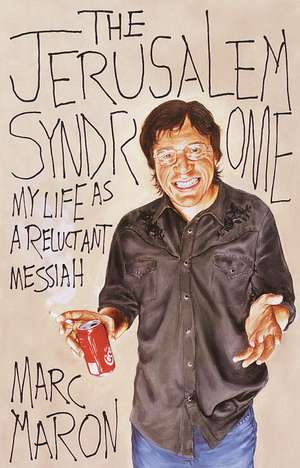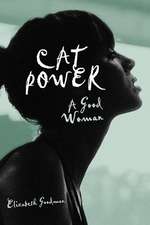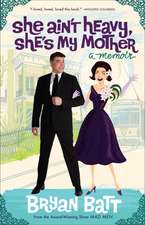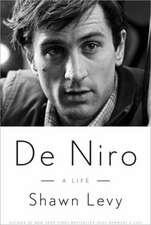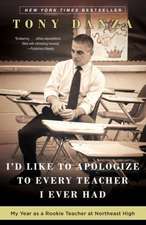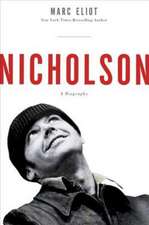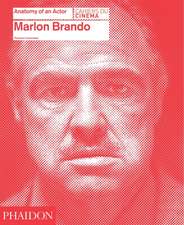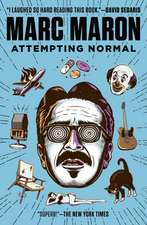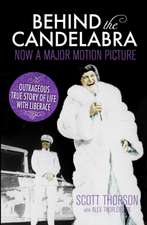The Jerusalem Syndrome: My Life as a Reluctant Messiah
Autor Marc Maronen Limba Engleză Paperback – 30 sep 2001
The Jerusalem Syndrome is a genuine psychological phenomenon that often strikes visitors to the Holy Land_the delusion that they are suddenly direct vessels for the voice of God. Marc Maron seems to have a distinctly American version of the Jerusalem Syndrome, which has led him on a lifelong quest for religious significance and revelation in the most unlikely of places.
Maron riffs on Beat phenomena with its sacred texts, established rituals, and prescribed pilgrimages. He spends some time exploring the dark side of things, as his obsessions with cocaine (known to Maron as “magic powder”), conspiracy theories, and famous self-destructive comedians convince him that the gates of hell open beneath Los Angeles. As his quest matures, he reveals the religious aspects of Corporate America, pontificating on the timeless beauty of the Coca-Cola logo and even taking a trip to the Philip Morris cigarette factory, where the workers puff their own products with a zealot-like fervor. The culmination of Maron’s Jerusalem Syndrome comes during his own tour of the Holy Land, where, with Sony camcorder glued to his eye socket, he comes face-to-face with his own ambiguous relationship to Judaism and reaches the brink of spiritual revelation_or is it nervous breakdown?
Marc Maron has considerably adapted and expanded his praised one-man show to craft a genuine literary memoir. Whether he’s a genuine prophet or a neurotic mess, he’ll make you laugh as you question the meaning of life.
“Marc Maron is blazingly smart, rapid-fire, and very funny . . . A brilliant and relentless screed.” ߝDavid Rakoff, author of Fraud
“Marc Maron is the first crazy person I’ve ever envied. In his brainiac-memoir-meets-hilarious-travelogue, he demonstrates the ability to tell a story with an extraordinary provocative intelligence that is regrettably shared by few.” _ Janeane Garofolo, comedian
Preț: 103.44 lei
Nou
Puncte Express: 155
Preț estimativ în valută:
19.80€ • 21.51$ • 16.64£
19.80€ • 21.51$ • 16.64£
Carte disponibilă
Livrare economică 31 martie-14 aprilie
Preluare comenzi: 021 569.72.76
Specificații
ISBN-13: 9780767908108
ISBN-10: 0767908104
Pagini: 192
Dimensiuni: 213 x 140 x 13 mm
Greutate: 0.27 kg
Editura: Three Rivers Press (CA)
ISBN-10: 0767908104
Pagini: 192
Dimensiuni: 213 x 140 x 13 mm
Greutate: 0.27 kg
Editura: Three Rivers Press (CA)
Extras
1
During the summer of 1998 my wife and I took a trip to Israel. I know what you're thinking: Israel? Is this going to be heavy? I understand. That's what our friends thought when we told them about our trip. When you tell people you are going to Israel it makes them nervous. It somehow implicates their lack of religion and they want to know why you're going. They get worried. "Are you going to get Jewy?"
They don't know what you're going to be like when you get back. People change. Am I going to walk off the plane davening down the gateway wearing a tallit and a yarmulke with payes bouncing beside my ears? Then they're going to think, Now it's weird. We can't go to their house anymore, certainly not on Saturdays. That pretorn toilet paper thing gives me the creeps.
We didn't go to Israel to get Jewy. We went because a friend of mine invited us.
It was only after we got back from Israel that I read about Jerusalem Syndrome. This is a psychological condition that occurs in some visitors to the Middle East. They get to Israel and just snap. They think they are a biblical or religious figure like Moses, Jesus, or Muhammad. Some think that they are in a direct communication with God on a one-to-one level. Some think that their being in the Middle East is one of the keys that unlocks the final unfolding, which is what I like to call Armageddon.
In retrospect, I'm pretty sure I had a full-blown case of Jerusalem Syndrome. The catch is, I actually think I had it long before I left. It's hard for me to tell, because I always felt like I was special.
I was the first child of my parents and the first grandchild for both sets of grandparents. So, needless to say, I was special. For my entire life, until the day she died a few years ago, my Grandma Goldy would pull me aside from the rest of the brood, look me in the eyes, smiling, and say, "Marc-y, you're my number one." Then she would slip me a piece of dietetic coffee candy.
The other reason I believe I'm special is mystical. I was born on Kol Nidre, the eve of Yom Kippur. It is the holiest night in the Jewish religion. It was 8:10 p.m., September 27, 1963. A somber mood rippled through the Judaic collective unconscious. Jews around the world were repenting for their sins in shame, guilt, and fear. They were all asking God to write their names into the book of life for one more year as I slid out of my mother, covered in blood and crying in a Jersey City hospital. What does it mean? I don't know, but Jesus was born on Christmas--what are the odds? And if there is any core to my faith at all it is in that there are no coincidences. [There is no word in Hebrew for "coincidence."] Nothing happens in God's world by chance.
My father-in-law, Marty, wanted to be a rabbi but instead became a psychiatrist, thus cutting out the middleman, God. I asked him if he had heard of Jerusalem Syndrome and told him the symptoms. He said he had never come across it but it sounded to him like a decompensating borderline personality disorder, paranoid schizophrenia with delusions of grandeur or mania, which is what I like to call the fun side of bipolarity. He was, all and all, very clinical.
Maybe if he had become a rabbi it would've been a longer conversation, had over a stack of sacred texts revolving around how God manifests himself in this world and how all Jews that follow the rules want and expect to experience revelation. The Hasidim believe that all behaviors of people and all events, good or bad, are manifestations of God on Earth. They are put before us so we may engage our free will and make a choice between life or death, good and evil, God or self. This illustrates one of the primary differences between Jews and Christians. In the Christian texts the wages of sin is death. In the Jewish texts the wages of sin are negotiable. There are those of us who don't follow the rules.
I'm not a religious person. I was born in New Jersey. I was raised in Albuquerque, New Mexico. My parents were of the first generation of Jews to move as far away from their parents as possible for reasons other than fleeing a country. They just had to get away. When people ask me what I am, I tell them, "I'm a Jew but I'm not a Jew."
2
Before we left New Jersey we lived in Pompton Lakes with my grandparents, Jack and Goldy. My father was never around because he was busy finishing medical school and my mother was never around because she was busy trying to finish becoming herself--a project she is still working on. She was twenty-two when she had me. For my formative years my soul and being were in the care of my Grandma Goldy.
She was a tall woman with a charming smile that could disarm anyone in seconds. She talked to everyone everywhere about everything in her life that made her proud, which was usually me. When Grandma looked down at me and smiled, it was one of the only times I really understood what it felt like to be loved. Godly Goldy was the keeper of an eternal stash of melon balls, boiled chicken, and soup. To me this was the holy trinity. One of the only objects of hers I took after her death was her melon baller. I use it in the summer as a device to go back in time.
My Grandpa Jack was an average-size man with a protruding round belly, thinning white hair and a strange bump on his forehead. He looked like a Jewish Buddha. He was always curious about how things worked and he could seemingly fix just about anything, if he could find a screwdriver and his glasses. Finding Jack's glasses was a frequent activity and one of the rituals that bonded my grandparents. Jack's disposition wavered among engaged, irritated, and amused. He had a nasal giggle that could stop time because time wanted to let Jack laugh. When Jack smiled, everything within a fifty-foot radius of him smiled. When Jack yelled, the same things ran for cover. He was a powerful man.
During the day Jack sold televisions, air conditioners, washers, dryers, and dishwashers at his appliance store in Haskell. Had for years. He helped bring the hill people of that region, the Jackson Whites, into the age of electronic convenience and entertainment. He was an early emissary of illusion. At night and on weekends he would alternate between reading everything--magazines, newspapers, books--and watching TV. He fed on information. He could watch any sport with an equal amount of interest, whether it was football or curling. He knew enough about everything to have an opinion sufficient to converse intelligently in the time afforded him by commercial breaks. He would lie on his side on the sectional with his head on one of the cushions turned perpendicular to the back of the couch. He always had his arm pointing straight up into the air with his clicker in his hand like a divining rod. It looked uncomfortable to me, but maybe there was method to it. Maybe God was guiding his channel selection.
The television was mounted in a wall in the den. The back of the set jutted out into a closet. Sometimes I would go into the closet and stand behind the set and my grandpa would say, "I can see you on TV." We played that game often. I transcended channels. It was a lie I wanted to believe.
Next door to my grandparents lived the Nurik family: Irv, Marjie, Jody, Tracy, Cary, and Jeff. At one time or another they all baby-sat my brother, Craig, and me and they had a pool, so we were over there often. Irv was a hyperintelligent man, obsessed with film. He had shelves crammed with books about movies. I couldn't stop looking at those books. There were stills from films I had never seen set beside formal portraits of the actors in them. To me, they were portraits of magicians capable of conjuring perfect realities. I became fascinated with the black and white faces of Hollywood's Golden Age. I could name them like some kids could name baseball players. I didn't know what Tom Seaver looked like, but I could identify Lionel Barrymore at a distance.
Deep within the Nurik house was a cave of enlightenment that permanently changed the way I looked at the world. The first time Cary baby-sat us, I remember walking through a hallway in their house, then up some stairs into a small dark room that seemed to resonate with a compelling weirdness. Cary was a bearded teenager and the keeper of a mystical domain. The walls and ceiling of his room were entirely covered with posters: an American Indian smiling with a sandwich ("You don't have to be Jewish to love Levy's real Jewish rye"), Zappa Crappa, The Fillmore, Procol Harum, Hendrix, the Marx Brothers smoking a hookah, W. C. Fields, Muddy Waters, and foldouts from Crawdaddy magazine. There were at least two thousand records lining every wall of the room. There were stacks of Mad magazines in the corner. Above his desk in a frame was the promotional lobby card of the cast of Tod Browning's Freaks. Irv's books and Cary's room singed themselves onto my cortex. They left a brand that marked a doorway to dark mysteries in my mind. Behind that door lay the isolated suffering of the human oddity, the enchanting, dark spell cast by celluloid royalty and the chaotic, drug-soaked spirituality of the sixties.
3
We left New Jersey when I was seven and moved to Anchorage, Alaska, where my father did a two-year stint in the air force and my mother faded into a self-obsessing darkness.
Our next-door neighbor was a woman named Esther. She baby-sat us. My mother would walk us over to her house, and when the door opened the warm smell of cigarettes and stewing meat would engulf us. Her living room felt like the lair of a witch. It was always dark and eerily cluttered with Chinese, Japanese, and Eskimo artifacts and art. Everything was mysterious and delicate in Esther's house, including Esther. She looked like she was a hundred years old but had the energy and intensity of someone half that age. She would sit in a big chair in a cove by the door surrounded by shelves filled with little boxes, statuettes, books, and pieces of fool's gold. She had the air of royalty in exile. My brother and I would sit with her and she would smoke and tell us stories about bears and the beginning of time, which I believed she personally witnessed. She told us that God caused earthquakes and snowstorms to remind people who was in charge and that when people died God was bringing them home. It was the first I'd heard of this "God" idea.
Esther told us about her father, the pioneer, the westward expansion, and the construction of the railroad. Listening to Esther was like listening to a crumbling mountain or an emphysemic tree talk about what it had seen. Every so often her husband, a tall, quiet American Indian who always seemed to be wearing a jumpsuit, would come in and empty her ashtray. One day, after the stories, Esther pulled a box off the shelf, opened it, and took out two Liberty dollars from the 1800s. She gave one to my brother and one to me and then sent us home with some stew, a personal account of America's secret history, and the knowledge that God was in charge of death, destruction, and the weather.
My friend Chris, who had a cleft palate and no other friends, was my first partner in adventure. We set out after school on a Friday with our lunchpails and some paintings we had done in art class. We walked along the inlet over mounds of rubble that had been plowed there after the great earthquake of '64. We found tiles, shattered doorframes, and a fork, the residual artifacts of God's teachings. We lost track of the time and just kept walking until there was no more rubble, just a flat, barren dune that led up to a bridge that spanned the mouth of the inlet. There were a group of long-haired teenagers below the bridge cooking hot dogs on sticks over a campfire. How strange it must have been for them to see two seven-year-olds walk up out of nowhere with lunchboxes and artwork. They gave us each a stick and a wienie and told us to put the fire out when we were done. We watched them walk away and we ate the best hot dogs we had ever tasted. They were the hot dogs of freedom.
Chris and I were alone in the wilderness, and the sun was setting. We peed on the fire and walked up onto the bridge. It was a railroad bridge, and beyond it was nothing but water covered by a blanket of boulder-size chunks of ice for miles. We stood there looking for whales.
The sky was gray and the air was skin-stinging cold. I could feel the expanse of the land and water in my mind and the weight of being so close to the top of the world. The pressure of a magnetic pole and the axis of the planet pulled me open into that gray and it became a peaceful backdrop, an open-ended tone humming mystical and spiritual possibilities. I closed my eyes and took a deep breath, and then, through his nose, Chris said, "We are in so much trouble."
We were in trouble, but to this day that Gray comes over me. It is an inner retreat that opens when the fragments of memory of every second of my life contract together in those flashes of eternity triggered by a smell or a sound or another person or just a moment when the doors of the train open into the air. It usually happens on crisp fall days at the onset of winter. There is a dull burst in my chest, a fleeting wholeness that fills me, and I am transported to the top of the world, where I stand alone and become the only connection between sky and Earth in a private audience with the idea of God.
The morning we were jolted awake by the house shaking, my father ran into our room and pulled my brother and me out of our bunk beds and into the cold morning air. Craig and I were in our pajamas. My dad was in his underwear and my mom was in her nightie. We all stood beneath the front doorframe. My father insisted that it was the safest place to be while the plates of the Earth shifted below us. Everything in my line of vision shook to the deep rumble. It was only a tremor, and no one was hurt. It was scary and awe-inspiring to feel completely out of control while God showed off.
During the summer of 1998 my wife and I took a trip to Israel. I know what you're thinking: Israel? Is this going to be heavy? I understand. That's what our friends thought when we told them about our trip. When you tell people you are going to Israel it makes them nervous. It somehow implicates their lack of religion and they want to know why you're going. They get worried. "Are you going to get Jewy?"
They don't know what you're going to be like when you get back. People change. Am I going to walk off the plane davening down the gateway wearing a tallit and a yarmulke with payes bouncing beside my ears? Then they're going to think, Now it's weird. We can't go to their house anymore, certainly not on Saturdays. That pretorn toilet paper thing gives me the creeps.
We didn't go to Israel to get Jewy. We went because a friend of mine invited us.
It was only after we got back from Israel that I read about Jerusalem Syndrome. This is a psychological condition that occurs in some visitors to the Middle East. They get to Israel and just snap. They think they are a biblical or religious figure like Moses, Jesus, or Muhammad. Some think that they are in a direct communication with God on a one-to-one level. Some think that their being in the Middle East is one of the keys that unlocks the final unfolding, which is what I like to call Armageddon.
In retrospect, I'm pretty sure I had a full-blown case of Jerusalem Syndrome. The catch is, I actually think I had it long before I left. It's hard for me to tell, because I always felt like I was special.
I was the first child of my parents and the first grandchild for both sets of grandparents. So, needless to say, I was special. For my entire life, until the day she died a few years ago, my Grandma Goldy would pull me aside from the rest of the brood, look me in the eyes, smiling, and say, "Marc-y, you're my number one." Then she would slip me a piece of dietetic coffee candy.
The other reason I believe I'm special is mystical. I was born on Kol Nidre, the eve of Yom Kippur. It is the holiest night in the Jewish religion. It was 8:10 p.m., September 27, 1963. A somber mood rippled through the Judaic collective unconscious. Jews around the world were repenting for their sins in shame, guilt, and fear. They were all asking God to write their names into the book of life for one more year as I slid out of my mother, covered in blood and crying in a Jersey City hospital. What does it mean? I don't know, but Jesus was born on Christmas--what are the odds? And if there is any core to my faith at all it is in that there are no coincidences. [There is no word in Hebrew for "coincidence."] Nothing happens in God's world by chance.
My father-in-law, Marty, wanted to be a rabbi but instead became a psychiatrist, thus cutting out the middleman, God. I asked him if he had heard of Jerusalem Syndrome and told him the symptoms. He said he had never come across it but it sounded to him like a decompensating borderline personality disorder, paranoid schizophrenia with delusions of grandeur or mania, which is what I like to call the fun side of bipolarity. He was, all and all, very clinical.
Maybe if he had become a rabbi it would've been a longer conversation, had over a stack of sacred texts revolving around how God manifests himself in this world and how all Jews that follow the rules want and expect to experience revelation. The Hasidim believe that all behaviors of people and all events, good or bad, are manifestations of God on Earth. They are put before us so we may engage our free will and make a choice between life or death, good and evil, God or self. This illustrates one of the primary differences between Jews and Christians. In the Christian texts the wages of sin is death. In the Jewish texts the wages of sin are negotiable. There are those of us who don't follow the rules.
I'm not a religious person. I was born in New Jersey. I was raised in Albuquerque, New Mexico. My parents were of the first generation of Jews to move as far away from their parents as possible for reasons other than fleeing a country. They just had to get away. When people ask me what I am, I tell them, "I'm a Jew but I'm not a Jew."
2
Before we left New Jersey we lived in Pompton Lakes with my grandparents, Jack and Goldy. My father was never around because he was busy finishing medical school and my mother was never around because she was busy trying to finish becoming herself--a project she is still working on. She was twenty-two when she had me. For my formative years my soul and being were in the care of my Grandma Goldy.
She was a tall woman with a charming smile that could disarm anyone in seconds. She talked to everyone everywhere about everything in her life that made her proud, which was usually me. When Grandma looked down at me and smiled, it was one of the only times I really understood what it felt like to be loved. Godly Goldy was the keeper of an eternal stash of melon balls, boiled chicken, and soup. To me this was the holy trinity. One of the only objects of hers I took after her death was her melon baller. I use it in the summer as a device to go back in time.
My Grandpa Jack was an average-size man with a protruding round belly, thinning white hair and a strange bump on his forehead. He looked like a Jewish Buddha. He was always curious about how things worked and he could seemingly fix just about anything, if he could find a screwdriver and his glasses. Finding Jack's glasses was a frequent activity and one of the rituals that bonded my grandparents. Jack's disposition wavered among engaged, irritated, and amused. He had a nasal giggle that could stop time because time wanted to let Jack laugh. When Jack smiled, everything within a fifty-foot radius of him smiled. When Jack yelled, the same things ran for cover. He was a powerful man.
During the day Jack sold televisions, air conditioners, washers, dryers, and dishwashers at his appliance store in Haskell. Had for years. He helped bring the hill people of that region, the Jackson Whites, into the age of electronic convenience and entertainment. He was an early emissary of illusion. At night and on weekends he would alternate between reading everything--magazines, newspapers, books--and watching TV. He fed on information. He could watch any sport with an equal amount of interest, whether it was football or curling. He knew enough about everything to have an opinion sufficient to converse intelligently in the time afforded him by commercial breaks. He would lie on his side on the sectional with his head on one of the cushions turned perpendicular to the back of the couch. He always had his arm pointing straight up into the air with his clicker in his hand like a divining rod. It looked uncomfortable to me, but maybe there was method to it. Maybe God was guiding his channel selection.
The television was mounted in a wall in the den. The back of the set jutted out into a closet. Sometimes I would go into the closet and stand behind the set and my grandpa would say, "I can see you on TV." We played that game often. I transcended channels. It was a lie I wanted to believe.
Next door to my grandparents lived the Nurik family: Irv, Marjie, Jody, Tracy, Cary, and Jeff. At one time or another they all baby-sat my brother, Craig, and me and they had a pool, so we were over there often. Irv was a hyperintelligent man, obsessed with film. He had shelves crammed with books about movies. I couldn't stop looking at those books. There were stills from films I had never seen set beside formal portraits of the actors in them. To me, they were portraits of magicians capable of conjuring perfect realities. I became fascinated with the black and white faces of Hollywood's Golden Age. I could name them like some kids could name baseball players. I didn't know what Tom Seaver looked like, but I could identify Lionel Barrymore at a distance.
Deep within the Nurik house was a cave of enlightenment that permanently changed the way I looked at the world. The first time Cary baby-sat us, I remember walking through a hallway in their house, then up some stairs into a small dark room that seemed to resonate with a compelling weirdness. Cary was a bearded teenager and the keeper of a mystical domain. The walls and ceiling of his room were entirely covered with posters: an American Indian smiling with a sandwich ("You don't have to be Jewish to love Levy's real Jewish rye"), Zappa Crappa, The Fillmore, Procol Harum, Hendrix, the Marx Brothers smoking a hookah, W. C. Fields, Muddy Waters, and foldouts from Crawdaddy magazine. There were at least two thousand records lining every wall of the room. There were stacks of Mad magazines in the corner. Above his desk in a frame was the promotional lobby card of the cast of Tod Browning's Freaks. Irv's books and Cary's room singed themselves onto my cortex. They left a brand that marked a doorway to dark mysteries in my mind. Behind that door lay the isolated suffering of the human oddity, the enchanting, dark spell cast by celluloid royalty and the chaotic, drug-soaked spirituality of the sixties.
3
We left New Jersey when I was seven and moved to Anchorage, Alaska, where my father did a two-year stint in the air force and my mother faded into a self-obsessing darkness.
Our next-door neighbor was a woman named Esther. She baby-sat us. My mother would walk us over to her house, and when the door opened the warm smell of cigarettes and stewing meat would engulf us. Her living room felt like the lair of a witch. It was always dark and eerily cluttered with Chinese, Japanese, and Eskimo artifacts and art. Everything was mysterious and delicate in Esther's house, including Esther. She looked like she was a hundred years old but had the energy and intensity of someone half that age. She would sit in a big chair in a cove by the door surrounded by shelves filled with little boxes, statuettes, books, and pieces of fool's gold. She had the air of royalty in exile. My brother and I would sit with her and she would smoke and tell us stories about bears and the beginning of time, which I believed she personally witnessed. She told us that God caused earthquakes and snowstorms to remind people who was in charge and that when people died God was bringing them home. It was the first I'd heard of this "God" idea.
Esther told us about her father, the pioneer, the westward expansion, and the construction of the railroad. Listening to Esther was like listening to a crumbling mountain or an emphysemic tree talk about what it had seen. Every so often her husband, a tall, quiet American Indian who always seemed to be wearing a jumpsuit, would come in and empty her ashtray. One day, after the stories, Esther pulled a box off the shelf, opened it, and took out two Liberty dollars from the 1800s. She gave one to my brother and one to me and then sent us home with some stew, a personal account of America's secret history, and the knowledge that God was in charge of death, destruction, and the weather.
My friend Chris, who had a cleft palate and no other friends, was my first partner in adventure. We set out after school on a Friday with our lunchpails and some paintings we had done in art class. We walked along the inlet over mounds of rubble that had been plowed there after the great earthquake of '64. We found tiles, shattered doorframes, and a fork, the residual artifacts of God's teachings. We lost track of the time and just kept walking until there was no more rubble, just a flat, barren dune that led up to a bridge that spanned the mouth of the inlet. There were a group of long-haired teenagers below the bridge cooking hot dogs on sticks over a campfire. How strange it must have been for them to see two seven-year-olds walk up out of nowhere with lunchboxes and artwork. They gave us each a stick and a wienie and told us to put the fire out when we were done. We watched them walk away and we ate the best hot dogs we had ever tasted. They were the hot dogs of freedom.
Chris and I were alone in the wilderness, and the sun was setting. We peed on the fire and walked up onto the bridge. It was a railroad bridge, and beyond it was nothing but water covered by a blanket of boulder-size chunks of ice for miles. We stood there looking for whales.
The sky was gray and the air was skin-stinging cold. I could feel the expanse of the land and water in my mind and the weight of being so close to the top of the world. The pressure of a magnetic pole and the axis of the planet pulled me open into that gray and it became a peaceful backdrop, an open-ended tone humming mystical and spiritual possibilities. I closed my eyes and took a deep breath, and then, through his nose, Chris said, "We are in so much trouble."
We were in trouble, but to this day that Gray comes over me. It is an inner retreat that opens when the fragments of memory of every second of my life contract together in those flashes of eternity triggered by a smell or a sound or another person or just a moment when the doors of the train open into the air. It usually happens on crisp fall days at the onset of winter. There is a dull burst in my chest, a fleeting wholeness that fills me, and I am transported to the top of the world, where I stand alone and become the only connection between sky and Earth in a private audience with the idea of God.
The morning we were jolted awake by the house shaking, my father ran into our room and pulled my brother and me out of our bunk beds and into the cold morning air. Craig and I were in our pajamas. My dad was in his underwear and my mom was in her nightie. We all stood beneath the front doorframe. My father insisted that it was the safest place to be while the plates of the Earth shifted below us. Everything in my line of vision shook to the deep rumble. It was only a tremor, and no one was hurt. It was scary and awe-inspiring to feel completely out of control while God showed off.
Descriere
Featured in his own HBO comedy hour, Maron now pens the spiritual memoir of your average hyperintelligent, ultraneurotic, superhip Jewish stand-up comedian and seeker.
Notă biografică
Marc Maron is a stand-up comedian and host of the podcast WTF with Marc Maron. He has appeared in his own comedy specials on Comedy Central and HBO, and his sitcom Maron airs on IFC. He lives in Los Angeles.
